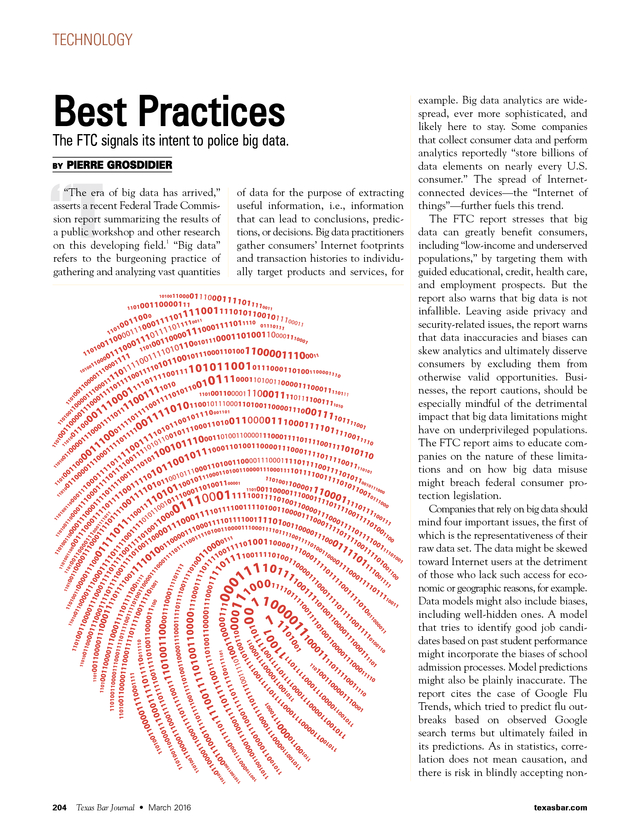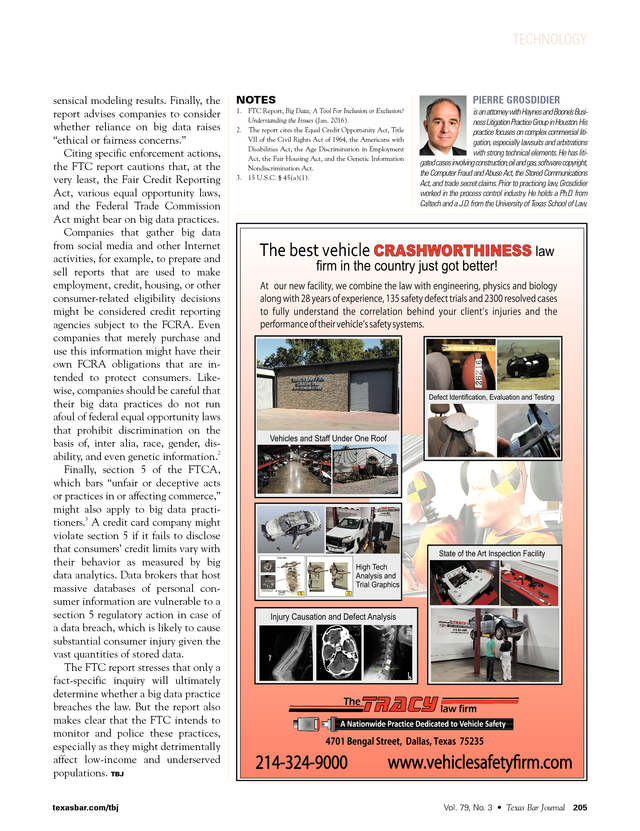Description
TECHNOLOGY
Best Practices
The FTC signals its intent to police big data.
BY
PIERRE GROSDIDIER
“The era of big data has arrived,”
asserts a recent Federal Trade Commission report summarizing the results of
a public workshop and other research
on this developing field.1 “Big data”
refers to the burgeoning practice of
gathering and analyzing vast quantities
“T
204
Texas Bar Journal • March 2016
of data for the purpose of extracting
useful information, i.e., information
that can lead to conclusions, predictions, or decisions. Big data practitioners
gather consumers’ Internet footprints
and transaction histories to individually target products and services, for
example. Big data analytics are widespread, ever more sophisticated, and
likely here to stay. Some companies
that collect consumer data and perform
analytics reportedly “store billions of
data elements on nearly every U.S.
consumer.” The spread of Internetconnected devices—the “Internet of
things”—further fuels this trend.
The FTC report stresses that big
data can greatly benefit consumers,
including “low-income and underserved
populations,” by targeting them with
guided educational, credit, health care,
and employment prospects.
But the report also warns that big data is not infallible. Leaving aside privacy and security-related issues, the report warns that data inaccuracies and biases can skew analytics and ultimately disserve consumers by excluding them from otherwise valid opportunities. Businesses, the report cautions, should be especially mindful of the detrimental impact that big data limitations might have on underprivileged populations. The FTC report aims to educate companies on the nature of these limitations and on how big data misuse might breach federal consumer protection legislation. Companies that rely on big data should mind four important issues, the first of which is the representativeness of their raw data set.
The data might be skewed toward Internet users at the detriment of those who lack such access for economic or geographic reasons, for example. Data models might also include biases, including well-hidden ones. A model that tries to identify good job candidates based on past student performance might incorporate the biases of school admission processes. Model predictions might also be plainly inaccurate.
The report cites the case of Google Flu Trends, which tried to predict flu outbreaks based on observed Google search terms but ultimately failed in its predictions. As in statistics, correlation does not mean causation, and there is risk in blindly accepting nontexasbar.com . TECHNOLOGY sensical modeling results. Finally, the report advises companies to consider whether reliance on big data raises “ethical or fairness concerns.” Citing specific enforcement actions, the FTC report cautions that, at the very least, the Fair Credit Reporting Act, various equal opportunity laws, and the Federal Trade Commission Act might bear on big data practices. Companies that gather big data from social media and other Internet activities, for example, to prepare and sell reports that are used to make employment, credit, housing, or other consumer-related eligibility decisions might be considered credit reporting agencies subject to the FCRA. Even companies that merely purchase and use this information might have their own FCRA obligations that are intended to protect consumers. Likewise, companies should be careful that their big data practices do not run afoul of federal equal opportunity laws that prohibit discrimination on the basis of, inter alia, race, gender, disability, and even genetic information.2 Finally, section 5 of the FTCA, which bars “unfair or deceptive acts or practices in or affecting commerce,” might also apply to big data practitioners.3 A credit card company might violate section 5 if it fails to disclose that consumers’ credit limits vary with their behavior as measured by big data analytics.
Data brokers that host massive databases of personal consumer information are vulnerable to a section 5 regulatory action in case of a data breach, which is likely to cause substantial consumer injury given the vast quantities of stored data. The FTC report stresses that only a fact-specific inquiry will ultimately determine whether a big data practice breaches the law. But the report also makes clear that the FTC intends to monitor and police these practices, especially as they might detrimentally affect low-income and underserved populations. TBJ texasbar.com/tbj NOTES 1.
FTC Report, Big Data; A Tool For Inclusion or Exclusion? Understanding the Issues (Jan. 2016). 2. The report cites the Equal Credit Opportunity Act, Title VII of the Civil Rights Act of 1964, the Americans with Disabilities Act, the Age Discrimination in Employment Act, the Fair Housing Act, and the Genetic Information Nondiscrimination Act. 3.
15 U.S.C. § 45(a)(1). PIERRE GROSDIDIER is an attorney with Haynes and Boone’s Business Litigation Practice Group in Houston. His practice focuses on complex commercial litigation, especially lawsuits and arbitrations with strong technical elements.
He has litigated cases involving construction, oil and gas, software copyright, the Computer Fraud and Abuse Act, the Stored Communications Act, and trade secret claims. Prior to practicing law, Grosdidier worked in the process control industry. He holds a Ph.D.
from Caltech and a J.D. from the University of Texas School of Law. Vol. 79, No.
3 • Texas Bar Journal 205 .
But the report also warns that big data is not infallible. Leaving aside privacy and security-related issues, the report warns that data inaccuracies and biases can skew analytics and ultimately disserve consumers by excluding them from otherwise valid opportunities. Businesses, the report cautions, should be especially mindful of the detrimental impact that big data limitations might have on underprivileged populations. The FTC report aims to educate companies on the nature of these limitations and on how big data misuse might breach federal consumer protection legislation. Companies that rely on big data should mind four important issues, the first of which is the representativeness of their raw data set.
The data might be skewed toward Internet users at the detriment of those who lack such access for economic or geographic reasons, for example. Data models might also include biases, including well-hidden ones. A model that tries to identify good job candidates based on past student performance might incorporate the biases of school admission processes. Model predictions might also be plainly inaccurate.
The report cites the case of Google Flu Trends, which tried to predict flu outbreaks based on observed Google search terms but ultimately failed in its predictions. As in statistics, correlation does not mean causation, and there is risk in blindly accepting nontexasbar.com . TECHNOLOGY sensical modeling results. Finally, the report advises companies to consider whether reliance on big data raises “ethical or fairness concerns.” Citing specific enforcement actions, the FTC report cautions that, at the very least, the Fair Credit Reporting Act, various equal opportunity laws, and the Federal Trade Commission Act might bear on big data practices. Companies that gather big data from social media and other Internet activities, for example, to prepare and sell reports that are used to make employment, credit, housing, or other consumer-related eligibility decisions might be considered credit reporting agencies subject to the FCRA. Even companies that merely purchase and use this information might have their own FCRA obligations that are intended to protect consumers. Likewise, companies should be careful that their big data practices do not run afoul of federal equal opportunity laws that prohibit discrimination on the basis of, inter alia, race, gender, disability, and even genetic information.2 Finally, section 5 of the FTCA, which bars “unfair or deceptive acts or practices in or affecting commerce,” might also apply to big data practitioners.3 A credit card company might violate section 5 if it fails to disclose that consumers’ credit limits vary with their behavior as measured by big data analytics.
Data brokers that host massive databases of personal consumer information are vulnerable to a section 5 regulatory action in case of a data breach, which is likely to cause substantial consumer injury given the vast quantities of stored data. The FTC report stresses that only a fact-specific inquiry will ultimately determine whether a big data practice breaches the law. But the report also makes clear that the FTC intends to monitor and police these practices, especially as they might detrimentally affect low-income and underserved populations. TBJ texasbar.com/tbj NOTES 1.
FTC Report, Big Data; A Tool For Inclusion or Exclusion? Understanding the Issues (Jan. 2016). 2. The report cites the Equal Credit Opportunity Act, Title VII of the Civil Rights Act of 1964, the Americans with Disabilities Act, the Age Discrimination in Employment Act, the Fair Housing Act, and the Genetic Information Nondiscrimination Act. 3.
15 U.S.C. § 45(a)(1). PIERRE GROSDIDIER is an attorney with Haynes and Boone’s Business Litigation Practice Group in Houston. His practice focuses on complex commercial litigation, especially lawsuits and arbitrations with strong technical elements.
He has litigated cases involving construction, oil and gas, software copyright, the Computer Fraud and Abuse Act, the Stored Communications Act, and trade secret claims. Prior to practicing law, Grosdidier worked in the process control industry. He holds a Ph.D.
from Caltech and a J.D. from the University of Texas School of Law. Vol. 79, No.
3 • Texas Bar Journal 205 .













